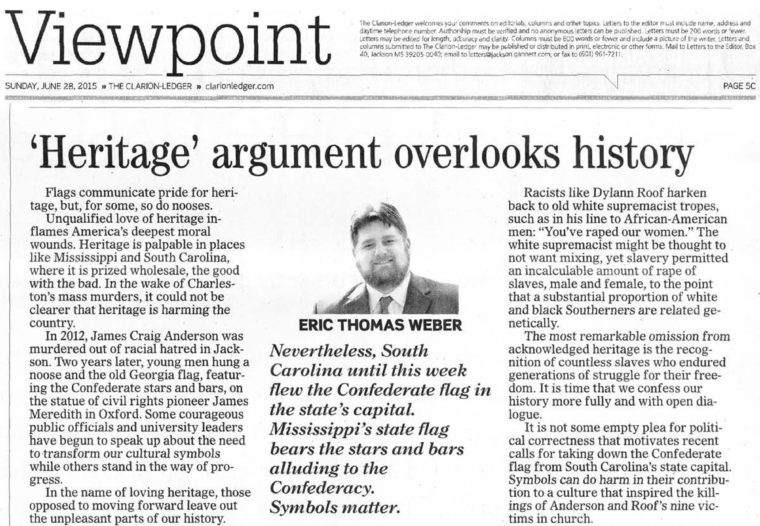This article was published online with the title “Sometimes Heritage Does Harm,” and in print, with the title “‘Heritage’ Argument Overlooks History.” It is republished here with permission. Click on the image or here to open a scan of the printed version, or here for a PDF of the online version. The text from the online version is included here below.
Flags communicate pride for heritage, but, for some, so do nooses.
Unqualified love of heritage inflames America’s deepest moral wounds. Heritage is palpable in places like Mississippi and South Carolina, where it is prized wholesale, the good with the bad. In the wake of Charleston’s mass murders, it could not be clearer that heritage is harming the country.
In 2012, James Craig Anderson was murdered out of racial hatred in Jackson,. Two years later, young men hung a noose and the old Georgia flag, featuring the Confederate stars and bars, on the statue of civil rights pioneer James Meredith in Oxford. Some courageous public officials and university leaders have begun to speak up about the need to transform our cultural symbols, while others stand in the way of progress.
In the name of loving heritage, those opposed to moving forward leave out the unpleasant parts of our history. Mississippi and South Carolina were among the states most honest about their defense of slavery in their justifications for secession. Nevertheless, South Carolina until this week flew the Confederate flag in the state’s capital. Mississippi’s state flag bears the stars and bars alluding to the Confederacy.
Symbols matter.
Continue Reading »







 About Me
About Me
This is the interview I gave Cherita Brown of Mississippi Public Broadcasting, MS’s NPR affiliate, and Professor Richard Gershon of the University of Mississippi School of Law on the relationship between the law and morality. Cherita also interviewed me about my forthcoming book, Uniting Mississippi: Democracy and Leadership in the South.
I hope to joint them again soon, as I had a great time. This is just one example of the collaborations I’ve enjoyed with the School of Law at the university, now that I’m an affiliate faculty member there.